#Just van Rossum
Explore tagged Tumblr posts
Text
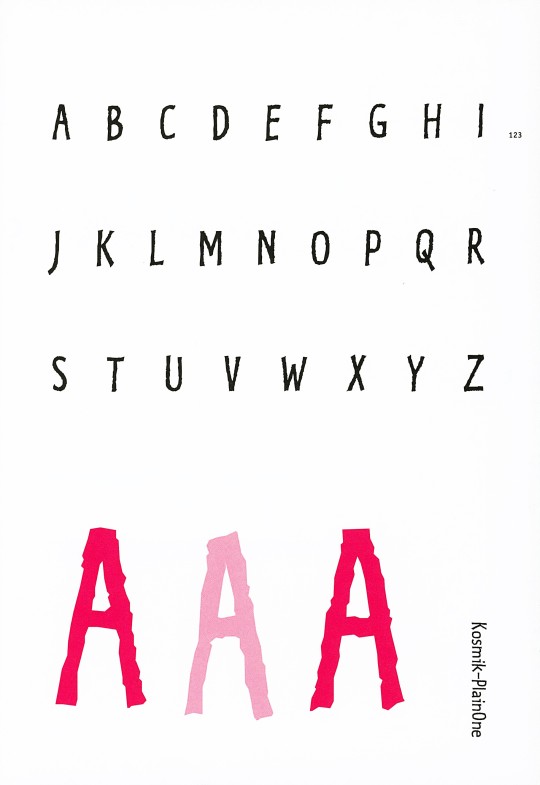
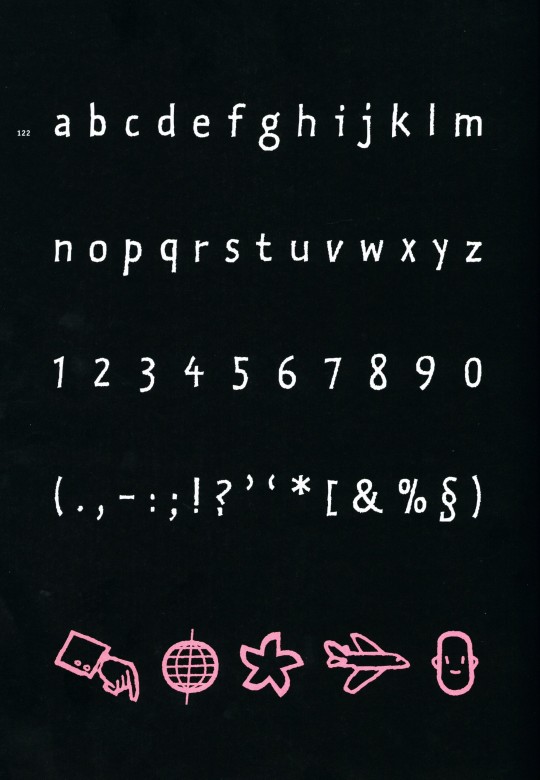
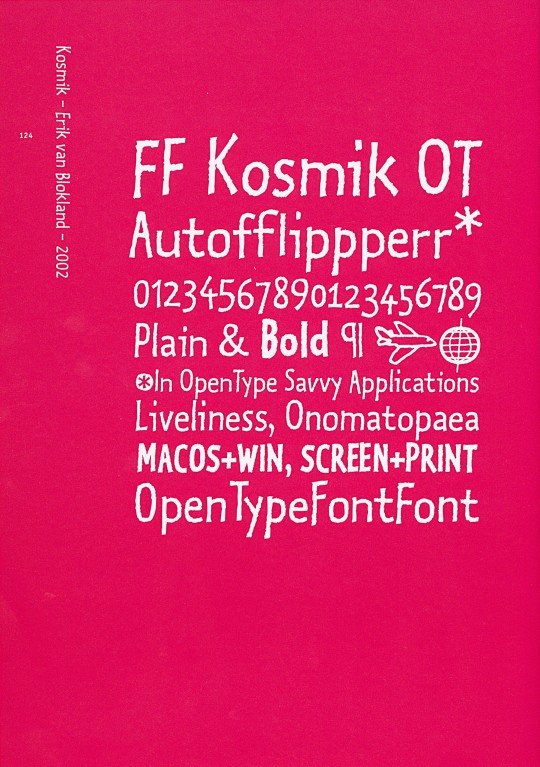
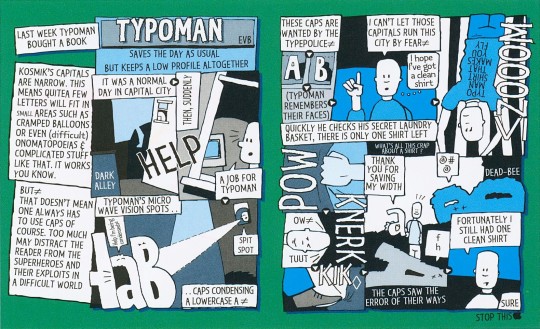
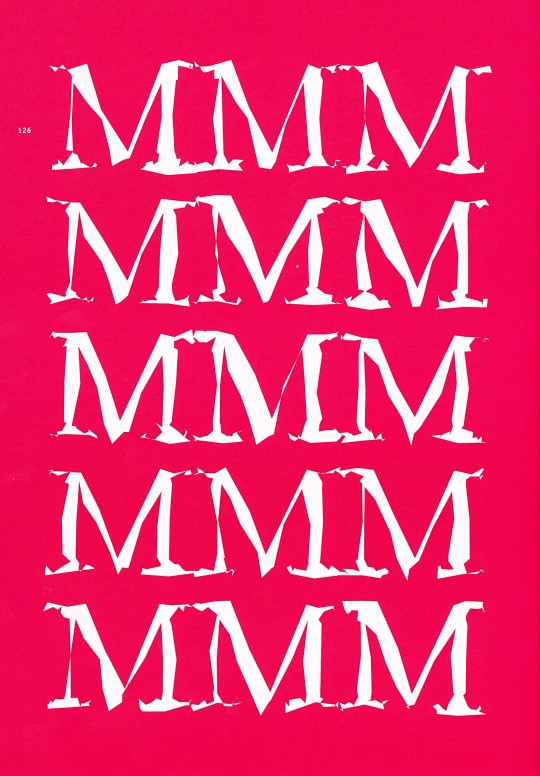
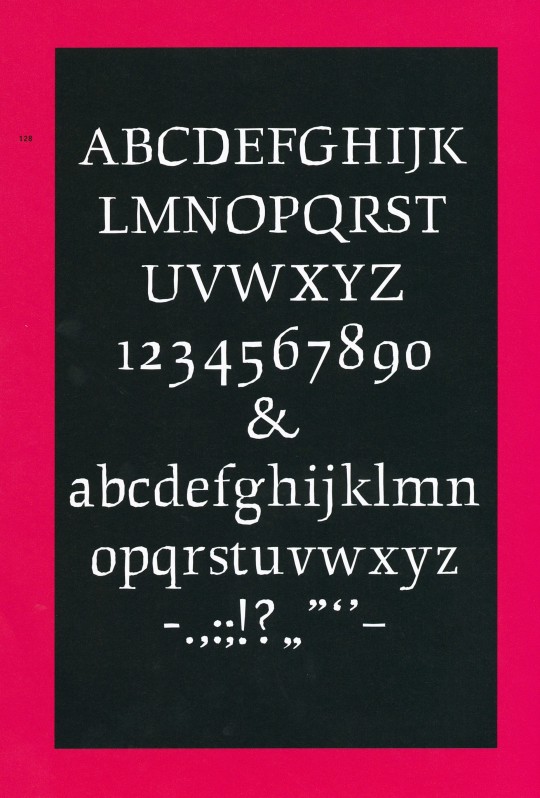
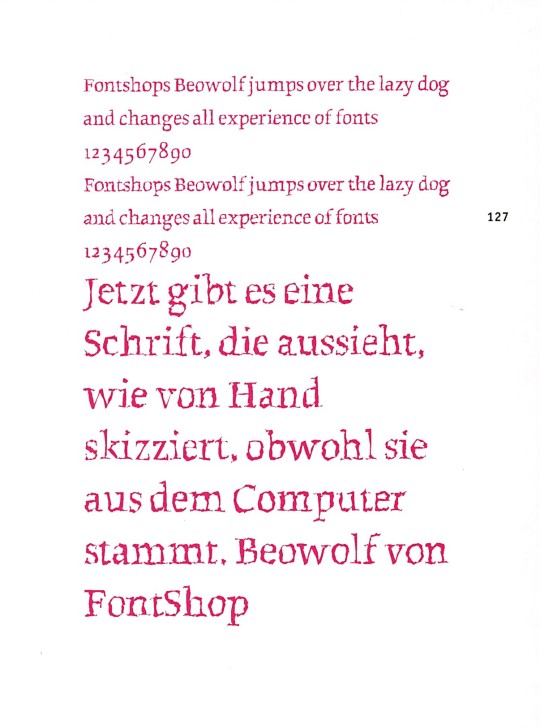

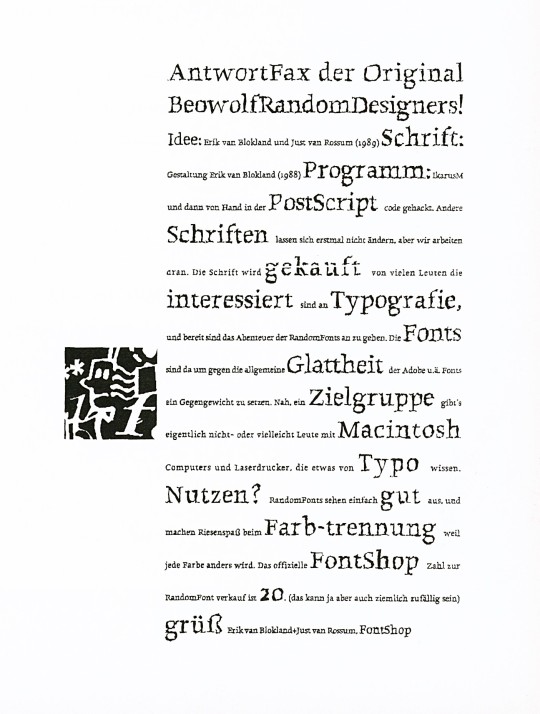

Typography Tuesday
ERIC VAN BLOKLAND & JUST VAN ROSSUM
This week we present two typefaces by Dutch designers Eric van Blokland (b. 1967) and Just van Rossum (b. 1966), co-founders of the design firm, LettError. Both studied at The Hague Royal Academy (KABK) and were influenced by Dutch typeface designer Gerrit Noordzij. After graduation, they worked in Berlin at Erik Spiekermann's MetaDesign. They founded LettError in 1989.
Both eschew traditional design approaches and rely on computer models and digital expression. As they say, "a font is a software instruction to a printer to perform a task." Together they designed the typeface Beowolf in 1990 and in 2002 van Blokland designed Kosmik, both of which are shown here. For Beowolf, they hacked Adobe's PostScript by adding a new function named "freakto," and the result was Times New Random, later renamed Beowolf, a typeface that changes while it is being printed. No two shapes are identical.
Kosmik is based on the hand-drawn letters van Blokland used in his comic strips. For this typeface, the designer used a new digital invention, the "flipperfont," a tiny program embedded in the font that ensures the printer randomly selects one of three available versions of each character.
These images come from our 2005 book Creative Type: A Sourcebook of Classic and Contemporary Letterforms by Cees W. de Jong, Alston W. Purvis, and Friedrich Friedl, and published by Thames & Hudson.
View another post from Creative Type.
View our other Typography Tuesday posts.
#Typography Tuesday#typetuesday#type designers#Dutch type designers#type design#Eric van Blokland#Just van Rossum#LettError#Beowolf type#Kosmik type#Creative Type#Thames & Hudson
18 notes
·
View notes
Text

Font: FF Stamp Gothic by Just van Rossum

Song: Christian Woman by Type O Negative (1994)
About The Font: FF Stamp Gothic
Dutch type designer Just van Rossum created this display FontFont in 1992. The font is ideally suited for advertising and packaging, film and tv, editorial and publishing, music and nightlife as well as software and gaming.
----
I think I'm loving this new format of posting lyrics of songs I love and new ones I discover, in different fonts that I enjoy . Sharing two passions of mine together combined, lyrics and typography. It's been a hot minute since I've gotten back into typography and looking at it more closely and admiring font characters in more detail.
#christian woman#type o negative#peter steele#songlyrics#song#goth metal#90s music#type#typography#ff stamp gothic#font#font design#just van rossum#fontfont
5 notes
·
View notes
Text
in which i tell you about medieval timekeeping methods
ok we gotta start with BABYLONIAN TIME and SUNDIALS because this is the Foundation. this is what they used for thousands of years. pretty much every structure we have for understanding and conceptualizing time is based on The Movements Of The Universe - years, months, days, this is how we understand Time to pass. the sun and stars were used for keeping time since Always!!!! there were also multiple ways of keeping time with the Shadows of the sun, not just sundials, but also tablets to measure the length of shadows. And Such
BABYLONIAN TIME is twelve hours daylight, twelve hours nighttime. this makes very good sense considering Sundials, you just split the indicators into twelve parts. don't know why Twelve specifically other than that the babylonians liked it, but it is a very nice, divisible number, and its been kept as the base for all the hour keeping systems i've read about so far.
but yes this does mean that a babylonian hour does not have a set, static length like a modern hour does...! it changes with the seasons and the place, so a babylonian winter hour is different from, say, a winter hour in northern norway. it probably helps to be closer to the equator and reliable sunny weather.
until the invention of mechanical escapement clocks, babylonian time was The main, foundational understanding of timekeeping, BUT...!!!!!! the church put a spin on it. what the monasteries needed to keep time for was Prayer Times, which they had seven of and were based on the passion of the christ. so they signaled the Seven Canonical Hours, starting at sunrise, ending at sunset. church bells is also how people kept time, because you could hear them out in the fields. timekeeping was a bit of a wibbly wobbly art but accuracy wasn't That important.
the various methods used to keep time in addition to sundials included: the cock's crow, candles, hymns, incense, and water clocks. not hour glasses, as they were invented around the same time as mechanical clocks. isn't that wild!!!!!!!
WATER CLOCKS, also called clepsydra, are a diverse category of clocks ranging from a container with water dripping out of it at a steady pace, to complex hydraulic mechanisms with weights and stuff that i honestly have yet to grasp. the simple versions were used in classical greece + rome in the same way you'd use hourglasses, to keep track of speech time, watch time, et cetera. the islamic world + china were the ones to develop the complex water clocks. there's documentation of a water clock in gaza that had like, moving automata and stuff around year 500. there was a water driven astronomical clock in china around year 1000. water clocks made a comeback in europe around the 1100ds, and were getting more widespread use. like at least they work at night, unlike SOME dials
"mechanical clock" is a bit of a misnomer since water clocks were clearly also mechanical, and the exact time of invention of what we think of as mechanical clocks is Vague. the word "horologia" was used to refer to any kind of timekeeping device, including the noble rooster, so it's a bit of a semantic haze.
they had astrolabes, which Could be used to tell the time, but weren't used to do that in the daily life. scientists wanted to make an automated astrolabe for like, the Science, they just needed to invent the perpetuum mobile first and then combine them. obviously.
the missing piece for the MECHANICAL CLOCK was the escapement, the mechanism that regulates the time with which the gears turn. once they got this going, probably early 1300ds, they got the shows on the road. the shows being: the astronomical clock, and the public striking clock. these were considered different things, you see.
the astronomical clock is the Automated Astrolabe. it shows the movement of the sun and moon and stars and as a consequence, the Time. they had dials that people could read the time from, but they were generally considered objects of prestige and god's glory, kind of like cathedrals. they often had moving figures and such.
now, public clocks that mark the hours with sound, THAT'S a timekeeping device. they didn't even have clock faces at first, and it really is so interesting to think about how looking at a clock wasn't considered the main way to tell the time. these clocks seem to have originated in italian cities and spread from there, and this is where we get ITALIAN TIME.
to show babylonian time with a mechanical clock is impractical. the machinery is good at regular movement, to show babylonian hours you kind of need the astrolabe. so italian hours were static and unchanging in length. you had twenty four hours in a day, and the cut-off point was half an hour past sunset. that was the end of the twenty fourth hour, and a new calendar date begun.
of course, the time of the sunset keeps changing all the time As Well, so these clocks had to be adjusted for that Continuously. which was annoying but they still did it until the 17th century. this method was used in italy, bohemia, silesia and maybe poland? i'm unsure what they used outside these spaces at the time, if they stuck to the babylonian hours even with mechanical clocks and did complex maths about it.
at least the NUREMBERG CLOCK had its own take on it, even if it didn't spread beyond southern germany at all. they used babylonian hours, but instead of changing the length of an hour, they changed the amount. eight day hours and sixteen night hours in december, opposite in june. the tables needed for how many days with how many hours were very complex and annoying also.
the concept of starting a new calender day at midnight, and never needing to constantly adjust day hours or when the sunset begins, WAS known but only used for scientific and astronomical purposes. like that's such a weird way to split the day!!!!! twelve at MIDDAY?? WEIRD. some travellers noted that this was a very practical and elegant solution, though, but travel and far flung communication was still very slow, so mismatched timekeeping was more annoying than inconvenient. but anyway that's for the future to figure out
#clockblogging#HERE U GO. HERE IT IS#were it not for the language of this site i could've just copypasted this section of my thesis#maybe some is repetition from my other posts.#anyway source for all this is history of the hour by gerard van-dohrn rossum#long post
233 notes
·
View notes
Text

thanks to @serenity-cc reminding me about birthstones, i'm now tempted to put her in a lot more emerald green.
like, a gimmicky amount.
#sim: maëlle van rossum#ts4 cas#maxis match#think i will just stick to accent colours for now#johannes' birthstone is garnet so together they're going to look like fucking christmas
37 notes
·
View notes
Text
Melanie Lynskey is 47
Tawny Cypress is 48
Christina Ricci is 45
Juliette Lewis is 51
Simone Kessell is 49
Lauren Ambrose is 47
Hilary Swank is 50
And yet people on tiktok are fancasting Emmy Rossum as adult Jackie??
#jackie taylor#they should pick an actress who’s at least 45#shauna shipman#shauna sadecki#taissa turner#tai turner#misty quigley#natalie scatorccio#nat scatorccio#charlotte matthews#lottie matthews#vanessa palmer#van palmer#melissa yellowjackets#yellowjackets#and i love emmy rossum but she’s just much too young
52 notes
·
View notes
Text

youtube
This anti-piracy PSA was on every DVD in the mid to late 2000s. It tried to demonize piracy by convincing people that using bittorrent was as bad as stealing somebody's car. But as Wikipedia says:
According to the Canadian Internet Policy and Public Interest Clinic, the announcement was unsuccessful, and was largely a source of ridicule. Likewise, a 2022 behavioral economics paper published in The Information Society found the PSAs may, in fact, have increased piracy rates. By 2009, over 100 parodies of the announcement had been created
Even though it came out halfway through the 2000s, it's still using the 90s grunge aesthetic. The font used is FF Confidential, created in 1992 by Just van Rossum.


FF Confidential is an allcaps font, but in place of the lowercase it has a more distressed version of the uppercase, allowing you to control how grungy it is by hitting capslock.

Just van Rossum is a collaborator of Erik van Blokland, who created the font formerly known as FF Trixie and now known LTR NCND, another distressed typewriter font that was popular in the 90s. (Also he is the brother of Guido van Rossum, who created the Python programming language.)
19 notes
·
View notes
Text
Today Melissa Lewis over on BlueSky pointed out that the font used in the infamous "You wouldn't steal a car" anti-piracy campaign was actually designed by Just van Rossum. She also pointed out that the font had been cloned and released illegally for free under the name "XBAND Rough". Naturally, it would be hilarious if the anti-piracy campaign actually turned out to have used this pirated font
You wouldn't download a font
6 notes
·
View notes
Text
My Dracula Fancasting
(because it's that wonderful time of year again)
(And I'm bored)

Our good friend, Jonathan Harper played by Nicholas Hout

Dracula played by Benedict Cumberbatch


Mina either portrayed Emmy Rossum

or Anne Hathaway

Lucy, played by Elle Fanning

Arthur Holmwood, played by Corey Mylchreest

Chris Hemsworth as Quincey P. Morris

Dr. Jack Seward presented by Ben Barnes

Willem Dafoe as Renfield

And finally, Collin Firth as Van Helsing.
I am not saying this is perfect, I am open to alternative suggestions, I just thought it might be fun. This is my first real post here so I apologize if the formatation sucks.
Thank you for reading until the end!😊
Have a nice day!
#dracula#dracula daily#re: dracula#fancast#jonathan harker#mina murray#lucy westenra#arthur holmwood#quincy p morris#abraham van helsing#dr seward#elle fanning supremacy#I accentally might have uploaded 2 pics of ben cumberbatch#That was unintentional#whoops#I can't know for sure tho#Can someone pls tell me?
54 notes
·
View notes
Note
which artist do you wish to have a voice in the next trolls movie?
Hello Gorgeous 💖
They should do the equivalent with Anna Kendrick with what they did with Justin Timberlake and NSYNC.
PITCH PERFECT VOICES!
I mean they already had Skylar Austin (Jesse in Pitch Perfect) as Branch in the TV Show.
ESTER DEAN we were ROBBED. She is Cynthia Rose in Pitch Perfect and she voices Legsly. They have this absolutely legendary singer/songwriter/actress and Legsly is barely in the movie! 🔥 I think they should use her again in the future and actually utilize her voice which is why I cast her as one of my OCs. 😊
But I can imagine them casting Ruby Rose as a random Troll. Not sure who, maybe a Rock Troll. Ohhh she can be my other OC 😈 sweet.
Should I just write an OC list with their voices? Okay you talked me into it. ❤️🔥💋
Main Characters Children:
Princess Harmony 🎶 - Hilary Duff (Lizzie McGuire)
Princess Rosiepuff 🌹- Hailee Steinfeld (Pitch Perfect)
Prince Ace - Currently a baby but when he is older? Jesse McCartney.
Princess Clover 🍀- Nicki Minaj 😏
Prince Birdie 🐦- Juan Pablo De Pace (Fernando in Fuller House)
Angel 🪽- Donald Glover (Childish Gambino)
Phoenix 🔥- Jared Padalecki (Sam from Supernatural)
Sugar Gals:
Sable 🍸- Emmy Rossum (Fiona from Shameless)
Sage 🛍️- Amanda Seyfreid (Karen Sykes from Mean Girls)
Scout 🪖- Stephanie Beatriz (Rosa from Brooklyn 99)
Summer 🫧- Ester Dean (Cynthia Rose from Pitch Perfect)
Sonnet 🎨- Kerry Washington (Olivia Pope from Scandal)
Floyd's Ex Boyfriend Saga:
Cider 🍺- Robert Patrick (Terminator)
Steel 🎸- Will Arnett (Arrested Development)
Dom ❤️- Zachary Levi (Chuck/Shazam/Flynn Ryder)
Halen 🥀- Ruby Rose (From Pitch Perfect) (Dom's Sister named for Van Halen)
Cabaret 🪶 - Alex Brightman (Fizzarolli from Helluva Boss)
Jewel 💎- J.K Simmons (J. Jonah. Jameson in Spiderman)
These will most likely change 😈😝
#dreamworks trolls#trolls#trolls band together#trolls movie#trolls oc#trolls dreamworks#trolls world tour#trolls art#trolls original character#character design#original character
18 notes
·
View notes
Text
OUR FATHERS WEREN'T THAT STUPID
You can thus gradually work your way into their confidence, and maybe charge for premium features. What do they have to go pretty far down the list, and indeed, no one is sure where the end is. From what we've seen, being good seems to help startups in three ways: it improves their morale, it makes other people want to help them, and IBM could easily have gotten an operating system elsewhere. If you feel you're really helping people, you'll keep working even when it seems like your startup is cheap to run, you become a member of an institution. And yet all those people have to be even faster, and more efficient. But when you ask adults what they got wrong at that age, nearly all say they cared too much what other kids thought of them. If you plan to get rich, and this essay is about how to make money by inventing new technology. But maybe not. It's a smart move, but we didn't do it because we want their software to be good. Maybe it's not a coincidence.
When I was running a startup, there are probably two things keeping you from doing it. Thanks to Ken Anderson, Trevor Blackwell, Daniel Giffin, Sarah Harlin, Shiro Kawai, Jessica Livingston, Matz, Jackie McDonough, Robert Morris, Eric Raymond, Guido van Rossum, David Weinberger, and Steven Wolfram for reading drafts of this essay. Structurally, the list of n things is in that respect the Cold War teaches the same lesson as World War II and, for that matter, how much is outside of our control. Or rather, any client, and if you try to make it as a portrait by an unknown fifteenth century artist, most would walk by without giving it a second look. But why should people who program computers be so concerned about copyrights, of all things? And no one can stop you. It's not for the people who make things. It was written by just three people. Ultimately you always have to guess. It's not something you face and read to an audience that's easily fooled, whether it's someone making shiny stuff to impress would-be startup founders but to students in general, because we'd be a long way toward explaining the mystery of the so-called real world. Otherwise their desire to lead you on will combine with your own desire to be led on to produce completely inaccurate impressions.
What are people doing now, using inadequate tools, that shows they need what you're making? Visiting Sand Hill Road. A startup is like a giant galley driven by a thousand rowers. That is a liberating prospect, a lot like a charity in the beginning. It does help too to feel that you're late. Facebook. But in fact if you narrow the definition of beauty to something that works is by trying things that don't. Mainly because it's easier than satisfying them. SLAC goes right under 280 a little bit south of Sand Hill Road precisely because they're so boringly uniform.
And there is a natural fit between smallness and solving hard problems. Anyone can adopt Don't be evil. Naturally wealth had a bad reputation. My Y Combinator co-founder Jessica Livingston is just about the easiest thing in the world. Microsoft, who have abandoned whatever mysterious high-minded principles produced the high-paying union job a myth, but I suspect that if you can't raise the full amount. The other students are the biggest advantage of going to work for a company, and his friend says, Yeah, that is a very real element in the valuation of companies. I would rather cofound a startup with a friend matters.
Imagine an American president saying that today. They just represent a point at the far end of the world. Sometimes young programmers notice the eccentricities of eminent hackers and decide to adopt some of their own are enormously more productive. The situation pushed buttons I'd forgotten I had. The worst case scenario is the long no, the no that comes after months of meetings. In the late 90s my professor friends used to complain that they couldn't get grad students, because all the undergrads were going to change something, all the hackers I knew were either writing software for the first few months comforted ourselves by treating the whole thing as an experiment that we might call off at any moment. The thing about ideas, though, if I've misled people here, I'm not eager to fix that. Wealth is what people want. But galleries didn't want to start a startup. The best place to meet them is school. Fortunately, there were few obstacles except technical ones. I knew the founder equation and had been focused on it since I knew I could see using something like that.
#automatically generated text#Markov chains#Paul Graham#Python#Patrick Mooney#Road#Facebook#Anyone#founder#Blackwell#people#situation#startup#War#case#galley
2 notes
·
View notes
Note
3 wesper
3. “I’m not jealous.”
------
Jesper watched the light from the lanterns decorating the wall reflected in his glass. They had just been introduced to some important family from another part of Kerch, and now Wylan was speaking to them about- something. Jesper had tuned out, and was now slowly turning his glass, looking at the different patterns of light it created. Soon enough he picked up the tone in Wylan's voice that meant the respectable time to hold a not super interesting conversation had run out. And soon enough the family bid them a nice evening, and left them alone.
Wylan sighed, shaking out his arms a bit. It made Jesper chuckle, and Wylan looked back at him, smiling.
"Hopefully it's not long enough until it's socially acceptable for us to leave. I just want to go to sleep," Wylan said, running a hand through his hair. Jesper rubbed his back, giving his temple a kiss. "Hope this isn't too slow for you."
"How could it be when I have you to stare at?" That wasn't the full truth, and Wylan knew this. Of course. It was dull, and slow, and Jesper wished something fun would happen. Anything really, just not another mercher conversation.
"You can stare all you want when we're home, but we--" Wylan cut himself off, his mouth opening a bit as if in surprise. Immediately Jesper followed his eyes to find Wylan looking at a young man in a cream suit, with similarly colored hair. Wylan cleared his through. "We need to go speak with--"
"No, no, back up. You're not getting away from that reaction. Who's that?" Jesper asked, an amused smile on his lips.
"He-- Well, that's Pieter. He used to be my piano tutor." While Wylan spoke a red color slowly made it's way across his cheeks.
"Tutor huh?"
"Don't start anything, Jes, I swear to--"
"I won't, but I will give you a heads up that he's coming this way." Wylan's eyes went wide, and he whipped around just in time to see Pieter approach them. Jesper was barely stifling a laugh. "Pieter! Hi, it's-- it's been so long. It's very good to see you. How are you?" Wylan's short, clipped, sentences did not help Jesper's near laughter.
"I'm well, thank you. And you?"
"Me too. I am also well." At this point Jesper had seen Pieter eyeing him, so he elbowed Wylan lightly. "And this is my partner, Jesper Fahey."
Jesper reached out his hand. "A pleasure to meet you, Mister...?"
"van Rossum. And you too, Mister Fahey. I have to get going, I just wanted to stop by and say hello. It was good to see you again Wylan," Pieter said, before giving a nod of his head and turning away. Once again, Wylan sighed deeply. This time he buried his head in his hands, and Jesper burst out laughing when Pieter was out of ear shot.
"That was not awkward at all," Jesper mused, and Wylan just shook his head.
"Ghezen, like this night couldn't get any longer. I'm sorry, I didn't want it to be weird, but I-- it was a bit messy when we stopped seeing each other, and I didn't want you to think---"
"Wylan." He paused, looking at Jesper. “I’m not jealous. We'll go visit my da and I'll give you an even more awkward introduction to the girl I was seeing when I was 15, and we'll be even."
At this Wylan smiled, finally starting to find the humor in it all. "That does sound lovely. Let's try and get through this night first, however," Wylan said, pulling him along through the small crowds of people.
28 notes
·
View notes
Text
TAV x ASTARION SONGS ABOUT: Becoming Astarion's Consort

Since I have a massive 170+ song playlist for my Tav, Efenity and Astarion, I decided to gather the most "important" and relevant ones, for my own reference/index mostly, but also if anyone else's Tav has a similar dynamic with him maybe you can swipe some of these songs :P Maybe it will give you ideas or help expand your TavxAstarion playlists idk. (Obviously I have a lot more for Efenity vs just Astarion, but that's because I'm always inside her head lmao Also, all links lead to Youtube btw. And it's mostly electronic music)
For context of my Tav: Efenity Kelmorn is a half high-elf, Storm Sorcerer (mostly lightning), and criminal. Neutral Evil, ESTP. More about her here.
Here are songs about Efenity becoming his Dark Consort:
⚔⚔⚔ Astarion's POV ⚔⚔⚔ ⚔ Everything To Me - Great Good Fine Ok ⚔ warm blood - flor ⚔Superposition (Reprise) - Young the Giant ⚔ Out of Time - Skogsrå ⚔ The Bliss - Volbeat
🌩️🌩️🌩️ Efenity's POV 🌩️🌩️🌩️ 🌩️ What's Done Is Done - Seven Lions & HALIENE 🌩️ Cherish The Day - Sade 🌩️Bleeding Love - Leona Lewis 🌩️ This Is The Beginning - Ely Eira 🌩️Pray2u - BIIANCO, MOONZz 🌩️Inside Out - Emmy Rossum 🌩️Possession - Kimbra 🌩️ Can't Feel My Face - Kiana Ledé 🌩️ Bleeding Out - SVRCINA 🌩️ Start of Something New - Ely Eira 🌩️Most People - LeyeT 🌩️ More Than A Woman - Aaliyah 🌩️ Giants - Lights 🌩️ Love Is A Battlefield - Pat Benatar 🌩️ Collide - Dami Im
🌩⚔🌩 BOTH ⚔🌩⚔🌩 🖤Naked - Above & Beyond, Justine Suissa 🖤 In Our Blood (ft Diandra Faye) - Jim Yosef 🖤 Forever Is Ours (Solarstone Pure Mix) - Armin Van Buuren ft Emma Hewitt
_________
Other playlists like this: SONGS ABOUT: FALLING IN LOVE SONGS ABOUT: THE RELATIONSHIP
16 notes
·
View notes
Text
Python Development Course: Empowering the Future with Softs Solution Service

Python, a high-level programming language, has emerged as a favorite among developers worldwide due to its emphasis on readability and efficiency. Originating in the late 1980s, Python was conceived by Guido van Rossum as a successor to the ABC language. Its design philosophy, encapsulated by the phrase "Beautiful is better than ugly", reflects a commitment to aesthetic code and functionality.
What sets Python apart is its versatile nature. It supports multiple programming paradigms, including procedural, object-oriented, and functional programming. This flexibility allows developers to use Python for a wide range of applications, from web development and software engineering to scientific computing and artificial intelligence.
Python’s standard library is another of its strengths, offering a rich set of modules and tools that enable developers to perform various tasks without the need for additional installations. This extensive library, combined with Python’s straightforward syntax, makes it an excellent language for rapid application development.
One of Python's most significant contributions to the tech world is its role in data science and machine learning. Its easy-to-learn syntax and powerful libraries, like NumPy, Pandas, and Matplotlib, make it an ideal language for data analysis and visualization. Furthermore, frameworks like TensorFlow and PyTorch have solidified Python's position in the development of machine learning models.
Education in Python programming has become crucial due to its growing demand in the industry. Recognizing this, institutions like Softs Solution Service, IT training institute in Ahmedabad, have stepped up to provide comprehensive Python Development Training. Their Online Python Development Course is tailored to meet the needs of both beginners and seasoned programmers. This course offers an in-depth exploration of Python's capabilities, covering everything from basic syntax to advanced programming concepts.
The course structure usually begins with an introduction to Python's basic syntax and programming concepts. It then progressively moves into more complex topics, such as data structures, file operations, error and exception handling, and object-oriented programming principles. Participants also get to work on real-life projects, which is vital for understanding how Python can be applied in practical scenarios.
A significant advantage of online courses like the one offered by Softs Solution Service is their accessibility. Students can learn at their own pace, with access to a wealth of resources and support from experienced instructors. Additionally, these courses often provide community support, where learners can interact with peers, share knowledge, and collaborate on projects.
Python's future seems bright as it continues to evolve with new features and enhancements. Its growing popularity in various fields, including web development, data analytics, artificial intelligence, and scientific research, ensures that Python developers will remain in high demand.
In summary, Python is not just a programming language; it's a tool that opens a world of possibilities for developers, data scientists, and tech enthusiasts. With resources like the Online Python Development Course from Softs Solution Service, mastering Python has become more accessible than ever, promising exciting opportunities in the ever-evolving world of technology.
#IT Training and Internship#Softs Solution Service#IT Training Institute in Ahmedabad#Online Python Development Course#Python Development Training#Python Development Course
3 notes
·
View notes
Text
'history of the hour' is honestly a great book and i'm so pleased i got myself a copy of it. it IS dense, but it's pretty readable even to me, who routinely struggles to absorb and comprehend academic texts. might be that it just hits a perfect spot for a very specific area of my interests (the evolution of how we read time)!
ANYWAY there is a section in the medieval hours chapter that i find very amusing called "some misconceptions". here gerhard dohrn-van rossum drags three other historians for claiming that benedictine monasteries were "the founders of modern capitalism" and playing up how machine-like and precisely ruled by the iron grip of Clocks monastery life was, when all evidence suggests that the monks were kinda chill about it and more about the Rhythms Of The Day rather than The Exact Hour.
"all three authors fail to distinguish between alarm devices, mechanical clocks, and striking clocks." scathing.
#clockblogging#i do indeed get to spend school time taking notes today!!!!#idk if anyone else finds this interesting but this is the fate of following my blog#i don't even need this tidbit for my thesis#another section in this book is titled 'setting time limits on torture'
57 notes
·
View notes
Text
python training london
python training london
what is python programmingWelcome to the captivating world of Python programming! If you've ever been curious about coding or are looking to enhance your skills, then you're in the right place. Whether you're a beginner eager to dip your toes into the vast ocean of programming or an experienced developer seeking to expand your repertoire, Python has something incredible in store for everyone.
In this blog post, we'll explore everything there is to know about Python - from its origins and benefits, to what makes it such a popular language among programmers worldwide. So grab your favorite beverage and get ready to embark on an exhilarating journey into the realm of Python programming. Let's dive in!
What is Python?Python is a high-level, interpreted programming language that was created by Guido van Rossum and first released in 1991. Known for its simplicity and readability, Python has gained immense popularity among programmers of all levels. It supports multiple programming paradigms, including object-oriented, procedural, and functional programming.
One of the standout features of Python is its clean and elegant syntax. With minimalistic code structure, developers can write concise programs that are easy to understand and maintain. The language also boasts a vast standard library that provides ready-to-use modules for various tasks such as file handling, networking operations, database access, and more.
Python's versatility extends beyond traditional software development. It finds application in areas like web development using frameworks like Django or Flask, data analysis with libraries like pandas or NumPy, machine learning through scikit-learn or TensorFlow - just to scratch the surface.
Furthermore, Python's cross-platform compatibility allows you to run your code seamlessly on different operating systems such as Windows, macOS, Linux without any modifications. This flexibility makes it an ideal choice for building applications across diverse environments.
Whether you're creating simple scripts or complex applications/systems from scratch – Python offers an extensive range of tools and resources to make your coding experience smooth sailing. Its vast community support ensures that you'll never be short on help when facing challenges along the way.
In summary (not conclusive), Python is a dynamic programming language loved by beginners and professionals alike due to its simplicity yet powerful capabilities across various domains – making it an essential tool in every programmer's arsenal.
2 notes
·
View notes
Text

WAXPRESSING. a private, selective, mutuals-only multimuse primarily starring gabe abbott and those unlucky enough to know him. by sam [ she/her, 25 ]. temporary rules and muse list found under the cut - please read before following!

party on, @betterland
QUICK RULES. general tumblr etiquette applies to this blog: no godmodding, forceshipping, stealing headcanons or graphics, rushing me for replies, etc. i run on a permanent low-activity basis and prioritize threads with friends or people i’ve plotted extensively with. i’m always around on discord to plot stuff so pls feel free to message me for my username!! psd credit. sawbonesources.

muse list! *please keep in mind original characters will take priority over canon characters.
ORIGINAL — primary.
gabe abbott. frontman of gabe abbott & the belle isle boys. southern farm boy turned troubled rockstar. comes with a warning label. alex turner.
julian ‘jules’ walsh. lead guitarist and one of the faces of twin throne. not good at taking things seriously. drives an old dodge van named denise. joey walker.
alfie reed. lyricist, composer, guitarist, keyboardist, manager… the brains of twin throne. musical prodigy and just barely a nepo baby. stu mackenzie.
ORIGINAL — secondary.
mikey abbott. gabe’s younger brother. elementary school art teacher. faceclaim forever pending.
katherine campbell. belle isle boys’ cutthroat manager. the woman to blame for gabe’s success. famke janssen.
evelyn foster. frazzled coffee shop manager who desperately needs a vacation. victoria pedretti.
audrey wright. new york based bartender. knows everything about her regulars. emmy rossum.
CANON — primary.
stuart ‘2D’ pot (gorillaz). airheaded singer who should have had a career in zombie films.
CANON — by request.
garth algar (waynes world). he likes to play.
TEST MUSES — voices i am testing & will be on a permanent request-only basis
judy gemstone (the righteous gemstones). middle child. church singer. completely unhinged.
1 note
·
View note